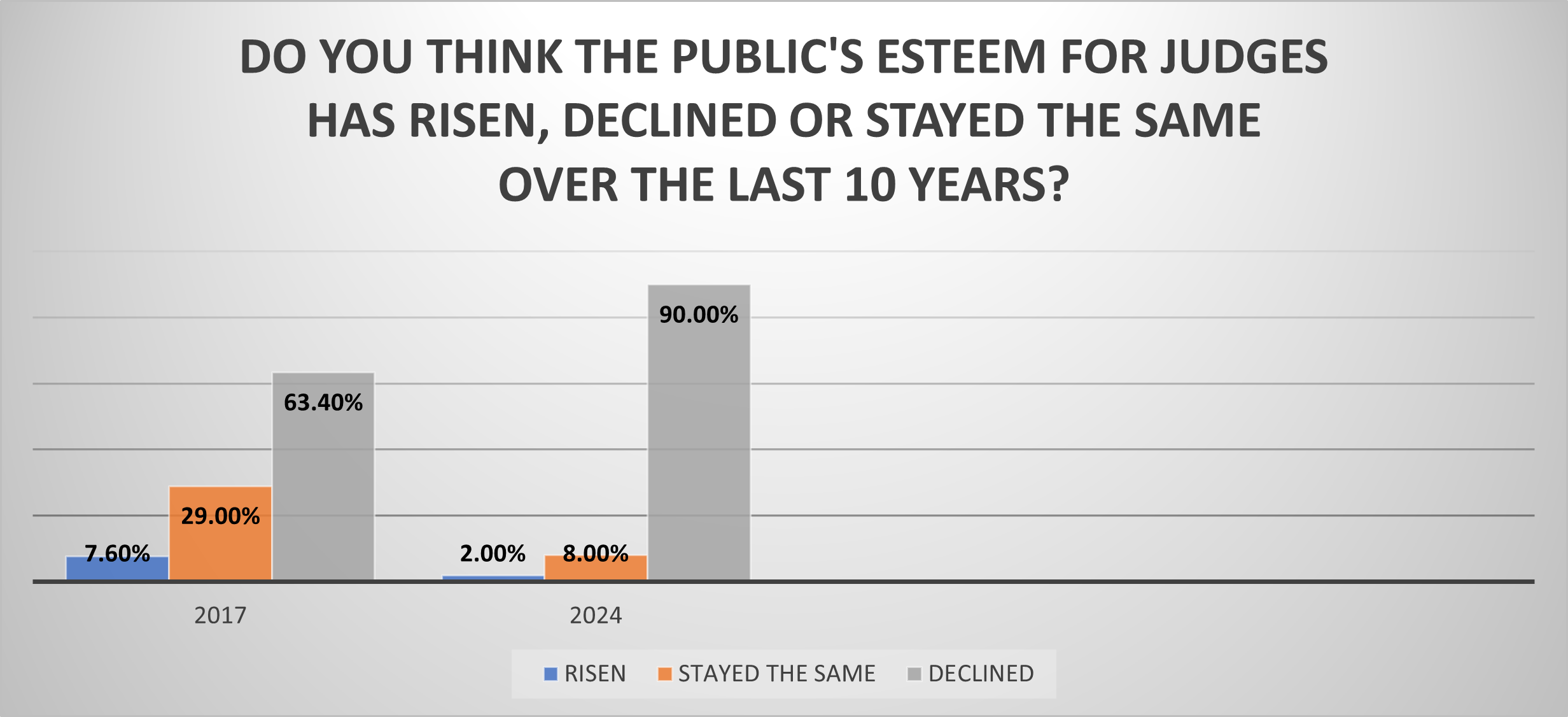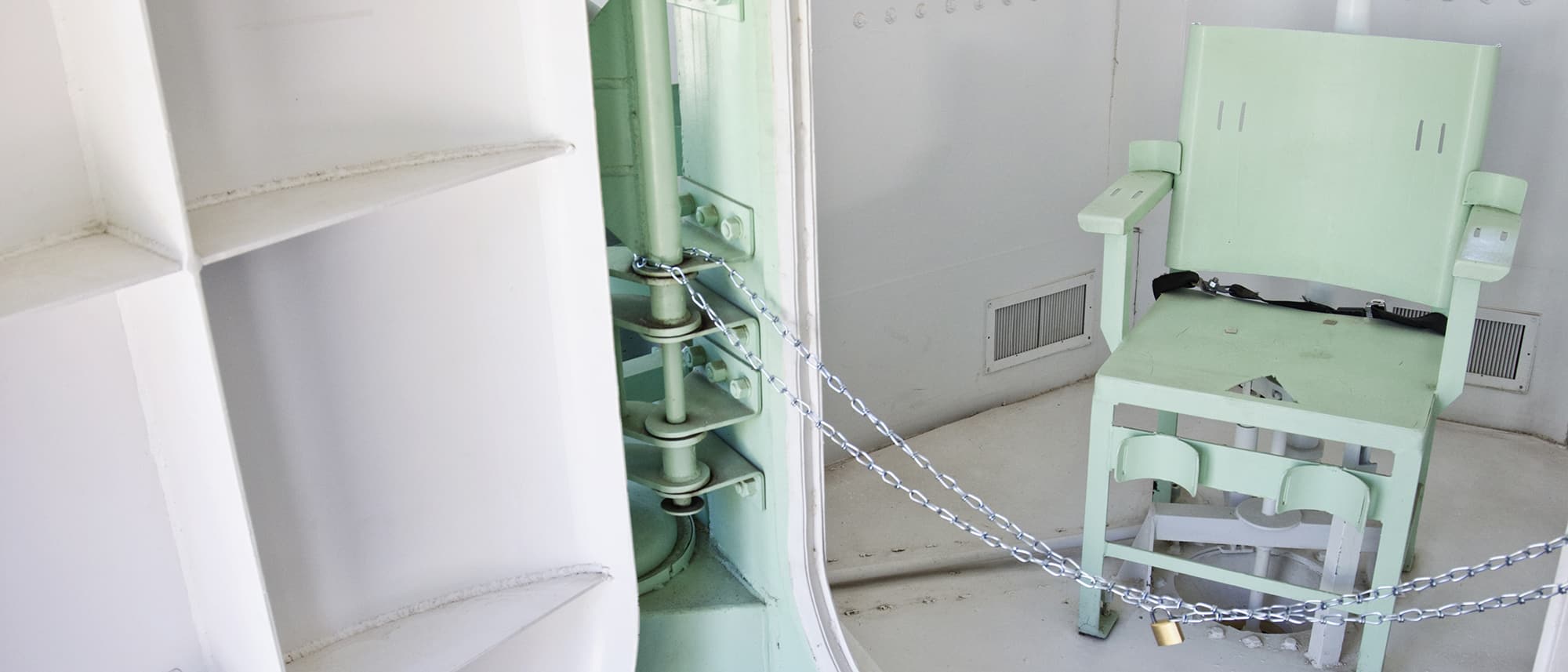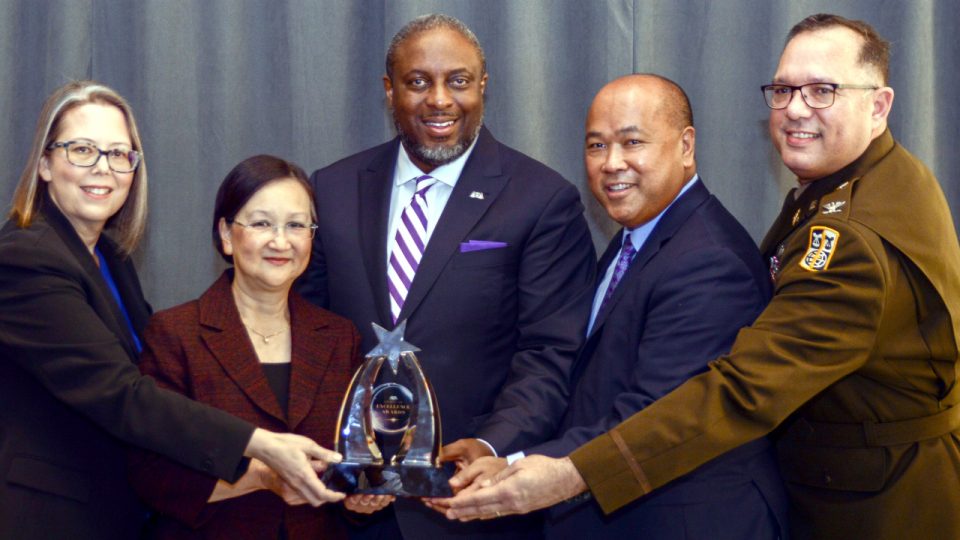

The survey results are in, and we’re sad to report that nearly two-thirds of judges feel that their standing with the public has deteriorated.
Earlier this month our Question of the Month debuted by asking NJC alumni if they felt the public’s esteem for judges had risen, declined, or stayed the same in the past 10 years. Of the more than 1,400 judges who responded, 63 percent said they thought it had declined; less than 8 percent thought it had improved; 29 percent thought it had stayed the same.
Among the more than 200 judges who left a comment, a common refrain was that the judiciary had been tainted by politicization.
“[T]here is a growing perception that the judiciary is just another political institution that is swayed by political considerations rather than the rule of law,” said Reggie B. Walton, senior federal judge of the U.S. District Court for the District of Columbia and former presiding judge of the Foreign Intelligence Surveillance Court. He blamed the perception “in large part” on the politicization of the process for selecting judges.
Judge John R. Lockett of the 13th Judicial Circuit in Alabama said the “ugly partisanship” of national politics “has also tainted the public’s perception of the judiciary.”
An anonymous judge stated simply, “The public now sees judges as politicians in black robes.”
Whether real or only perceived, politicization of the judiciary poses a threat to judicial independence. The College will offer its course When Justice Fails: Threats to the Independence of the Judiciary next month in Washington, D.C. The course looks at both historical and current events, including contemporary political pressures being placed on judges, national political rhetoric, and how public perception is shaped by expensive, bitter election campaigns for judgeships. More information and to register.
Students and donors in the D.C. area are also invited to a reception and talk by University of Utah Thode Professor of Law Wayne McCormack from 5:30-7:30 p.m. on March 27 at the Hamilton Crowne Plaza. McCormack will be speaking on current threats to judicial independence. For more information or to RSVP, email hill@judges.org.
Among other comments left by judges who voted in the poll: Some speculated that social media and a 24-hour news cycle had contributed to an erosion of confidence in the judiciary by amplifying the behavior of a few bad apples. Others blamed the unrealistic portrayal of judges on TV shows such as Judge Judy. Some complained of misinformation distributed by traditional media, to which judges sometimes feel they are unable to respond due to ethical statutes.
The poll was conducted Feb. 1 via an email sent to all judges who have attended NJC courses in the past seven years.
Here are some of the comments presented in their entirety
“While I do not believe that there has been a significant decline in the public’s esteem of judges, I do fear that there is a growing perception that the judiciary is just another political institution that is swayed by political considerations rather than the rule of law. If that perception is permitted to flourish, due in large part to the politicization of the selection process of judges, then eventually the respect for the judiciary, which historically has outmatched the other two branches of government, will decline.”– Hon. Reggie B. Walton, United States District Court for the District of Columbia
“I believe the ugly partisanship which has tainted our national politics has tainted the public’s perception of the judiciary. Too often public officials or party leaders demean the integrity of the bench by attacking judicial rulings by suggesting that they were simply the extension of a party’s orthodoxy. The public’s expectation of an independent and impartial judiciary diminishes as these types of attacks persist. As a result, the respect for judges as impartial arbiters of disputes has declined.”
– Hon. John R. Lockett, 13th Judicial Circuit, Alabama
“I think that for the most part, the public does not view judges the way they view the legislative and executive branches of government. The public desires and expects judges to be above the ‘partisan’ fray. The expectation is reasonable and I hope most judges do in fact stay separated and above ‘political’ decision making. We should.”
– Hon. Larry Harman, 7th Judicial Circuit, Missouri
“Social media continues to feed the public’s hunger for ‘fast food’ information about the judicial system, together with the other branches of government. As a result, the public is inundated with sensational headlines or hashtags and deprived of meaningful insight into the work of the judiciary. Bound by ethical rules requiring judges to avoid the political fray, the judiciary largely remains silent while rumor mongers rule the day.”
– Hon. Brad Newman, 2nd Judicial District Court, Montana
“Respect for judges has declined and their independence from political pressure is being attacked. Many factions of our society are trying to politicize the judiciary.”
– Hon. Gary P. Kramer (ret.), 23rd Circuit, Missouri
“The portrayal of judges and the judicial process on television and in the media in general has negatively distorted the public’s perception of the role of the judge in fact finding, decision making, and our resolution of cases and controversies. There is little that can be done to change the way we are portrayed. The only approach is to reach out personally or through representative entities to educate the public that what is portrayed is not an accurate reflection of the reality of our judicial demeanor, our process of fact finding, and how our decisions and rulings follow the rule of law. Judges must strive to support or personally engage in outreach, to the extent ethically allowed, to educate the public on how the majority us honorably conduct ourselves with deference to the rule of law and without personal bias in the decision making process.”
– Hon. Karl Grube, St. Petersburg Circuit Court, Florida.

RENO, NV (PNS) – As they eye their inaugural football season this fall, the Gaveliers have question marks...

RENO, Nev. (March 8, 2024) — In what may reflect a devastating blow to the morale of the judiciary, 9 out...

In what may reflect a devastating blow to the morale of the judiciary, 9 out of 10 judges believe the publi...

RENO, Nev. (Jan. 26, 2024) — The nation’s oldest, largest and most widely attended school for judges �...

RENO, Nev. (Feb. 7, 2024) — National Judicial College President & CEO Benes Z. Aldana received the Am...